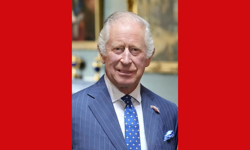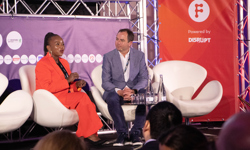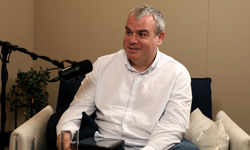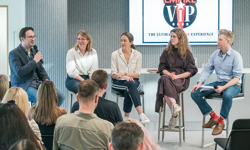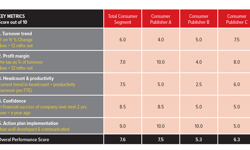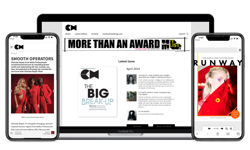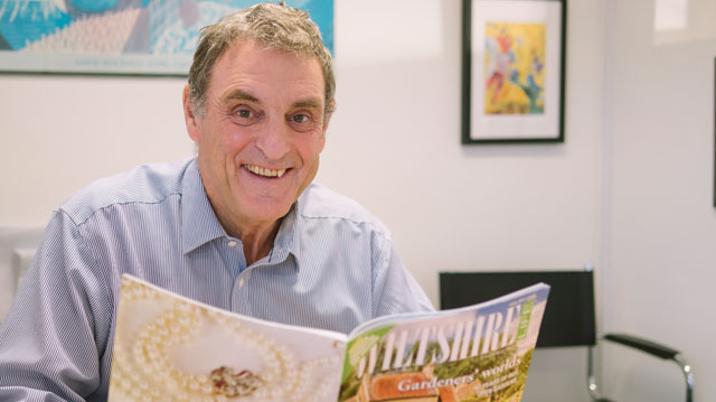
Q: How did you get where you are today?
A: There are several factors that tilted my professional life in the direction in which I have travelled and which have carried it forward. My career has been largely unplanned and has been the result of my response to unforeseen ‘circumstances’, or, as the country’s former prime minister, Harold Macmillan, said when asked what he feared most: “Events, dear boy, events”.
However, since starting my own company, I have always wanted to develop over time an entrepreneurial and successful business, of which I could be proud and which could create opportunities for staff.
The first ‘circumstance’ was a disastrous interview I had at Bristol University to study for a post-graduate course to become a social worker. At that point, I was all set for social work and the interview was two weeks before my final examinations for a degree in Social Studies at Durham University. I had, I felt, an impressive CV, having spent much of my gap year working in a London remand centre – a home for juvenile offenders – as well as having undertaken many volunteer projects.
At university, I started a branch of International Voluntary Service (IVS), a pacifist organisation that, sadly, no longer exists that aimed at bringing together people of all nations, backgrounds and colours. There, I ran a club to help psychiatric patients. I had become attracted to the aims of IVS when, immediately after leaving school, I had worked on one of its projects in Calabria, southern Italy, helping to build a bridge across a valley. Subsequently, I become the leader of an IVS work camp at a Rudolf Steiner village in the country. I had spoken, alongside the former Labour MP Tony Benn, at a large international meeting at the Festival Hall. As part of my course, I had worked one holiday in a hospital for severely ‘mentally handicapped’ patients (as they were then called) and as a temporary child care officer in Wapping. I was 22, hugely idealistic and social work and changing the world were part of my DNA.
Then came the interview. Whether deliberately or not, the interviewer set about trying to needle me, questioning my commitment. I don’t do psychological games. I left the interview frustrated and disillusioned. Back the same night in Durham, I wrote my first applications to be a journalist and got accepted as a graduate trainee at the Sheffield Star. In truth, journalism had been increasingly grabbing my attention, having befriended a journalist on the Northern Echo. I had dabbled in some student journalism. I loved words and my main outlet was writing poetry.
Becoming a reporter and serving ‘indentures’ on the Sheffield Star was a baptism of fire. I was a graduate, rare in those days, and from the ‘effete’ south (although I was born in Leeds and have always been immensely proud of my Yorkshire heritage). Graduates, particularly those from the south, were despised. I was a dreamy, poetry loving young man who had not got a clue about the hard school of northern journalism on a daily regional newspaper with four or five edition changes. Moreover, coming from a progressive school where these things did not seem to matter, I could not spell, let alone type. The editor screamed at me the first day when I spelt ‘accommodation’ with one ‘m’. I nearly left. Instead I decided to stick it out.
Gradually, I started to get my act together and three years later, I was good enough to get a job as an investigatory reporter on the Action Line column of the Daily Express in Manchester, then a broadsheet selling more than four million copies a day. I graduated to become a news and then a features sub editor. The work was both enjoyable and stressful, but the culture was brutal and aggressive. I vowed then that, if I were ever responsible for people, I would manage them entirely differently. Thankfully, I could just about spell by then! However, the social work bug was starting to get the better of me again and I launched another IVS group in Oldham. The work consumed me, but it was all non-stop. I was working nights on the Express but, during the day, I was running the IVS group where we had an enormous pool of volunteers for me to organise. I started to think again about social work as a career. And then I saw the job ad for Community Care that changed my life.
The ad said that IPC was launching a weekly social work magazine and appealed for applicants for the whole editorial team of eleven. I ticked every box from editor to reporter and was called for an interview in London. To my surprise, I was asked back for a second interview with a Mr Vic Williams, whom I subsequently discovered was the managing director of a division of IPC Business Press called ‘Building and Contract Journals’ where, with strange logic, Community Care was to be housed. Mr Williams was operating a ‘scorecard’ and, as the meeting progressed, I seemed to be accumulating more ticks than crosses, but I had no idea the reason for the interview. Finally, Mr Williams concluded matters: “Right, you’ve got the job”. “What job?”, I asked. “The editor’s job, of course. Did you not bloody know that, young man? I’ve been interviewing you for the editor’s position.” I reeled forward dumfounded. It had never dawned on me that I would be the launch editor and, in shock, my arm collided with his silver cigarette box on his desk, knocking his cigarettes to the floor. “Pick them up”, he barked. I sank to the floor on my knees, in hope as well as desperation scooping up the MD’s fags, having just been appointed Community Care’s launch editor.
It was not an auspicious beginning. I must have then cut a shambolic, chaotic, hopeless figure, so I have no idea what grain of talent Mr Williams saw in me, but I am eternally grateful. Unlike my Bristol University interview, my volunteering must have impressed and, although I had never had any formal management training, my background had given me varied experience in dealing with people.
My years on Community Care were enormously rewarding, absorbing and satisfying. Community Care was launched at exactly the right time, coming as it did with the creation of large social services departments and when there was a much more positive attitude to the profession. Matters started to change almost at once. If I recall correctly, our first issue in April 1974 featured the case of Maria Colwell, a seven-year-old girl who was brutally murdered by her step father, overlooked by the care system. Plus ça change! However, the magazine got off to a fantastic start, winning awards and making money from day one. It was soon the undisputed market leader, the most successful launch that IPC Business Press had achieved in years, becoming one of the top two or three most profitable magazines in the company’s stable.
It was such a lucky break for me and I could do no wrong. I was left alone to run my own show with no management interference whatsoever. Many Friday afternoons, Vic Williams would invite me to his office to drink whisky where we would chat. The editorial director was very affable but ineffective. His office was one floor below me. The only ‘interference’ I experienced at his hands was when I submitted my expenses one day after a long lunch with a very boozy director of social services. The editorial director’s internal note arrived three days later which simply said: “Two bottles of wine?”
I was enjoying life so much on Community Care that it came as a surprise and shock when, a few years later, I was asked to become the editor of Community Care’s stable mate, Nursing Mirror, which was experiencing a serious decline in circulation and low staff morale. I was ambivalent, but I accepted the challenge. I decided to launch a campaign about nurses’ pay, which was then at a low level. The campaign was very successful and circulation increased to overtake its competitor, Nursing Times. Subsequently, all this hard work was undone by a long-lasting National Union of Journalists strike involving all IPC journalists, when Nursing Mirror was off the news stands for seven weeks. It was soul destroying and Nursing Mirror never recovered from the damage the strike inflicted. A few years later, after I had left, Nursing Mirror was sold to its arch rival only for it to be integrated into Nursing Times: it was very sad and unnecessary. However, the editorial changes we had made to Nursing Mirror, as well as our successful campaign, had gained favour. I became the PPA’s Business Editor of the Year and, at the same time, Nursing Mirror won both the Magazine and the Campaign of the Year accolades. I was presented with my awards by the former prime minister, Harold Wilson.
It was 1983 when a head hunter came calling and another episode in my career unfolded, which finally led to me setting up my own business. I was then the publisher of Community Care and Nursing Mirror and I was relishing the challenge of having a more commercial role. The head hunter explained that International Thomson Publishing was wanting to become a dominant player in the saturated and highly competitive medical publishing market and needed someone to lead them to the promised land. I turned the job down twice but then, after being invited to a lunch at the Ritz hotel by my subsequent boss to explain my concerns, I accepted, very reluctantly. Thomson’s recent erratic track record in magazines was not impressive and I told him so.
Yet, against my written advice, Thomson insisted on going ahead with launching a GP magazine, which the company had been planning and they would not wait till I arrived. Indeed, my first day at Thomson coincided with The Physician’s first appearance and for which magazine I was now to be responsible, along with the much more established British Journal of Hospital Medicine (BJHM). The launch was a disaster: little understanding of the GP market, poor editorial and no advertising. I pleaded with my boss to throw in the towel immediately but to no avail. From the start, I was on the back foot. We struggled on for another year or so, losing loads of money and then the inevitable happened: Thomson tired of medical publishing and wanted out, just as I had feared.
So, I became an entrepreneur out of frustration and anger, buying both BJHM and The Physician from Thomson, and forming my own company. Possibly out of a feeling of guilt, Thomson behaved honourably at this difficult time, supporting me against rival bids, for which I thank them. Launching my own company was not easy as there was no money in the coffers. The intention was to go into partnership with a colleague who had moved from IPC Business Press to join me. However, he lost his nerve and bailed out soon after we had started promoting the company in our joint names. The situation got worse: I tried to borrow £10,000 from a NatWest branch in Somerset, where my family had banked for generations. My request was turned down.
I knew I could not survive unless I could very rapidly obtain more revenue. There was only one avenue open to me, but I did not consider the chances of success to be more than 50-50: to convert BJHM, which was much respected, from a free magazine, circulating to 35,000 hospital doctors, to a subscription-only journal. This plan succeeded beyond my wildest dreams. We managed to persuade 7,200 doctors to pay £32.50 for the privilege, thus generating, at a stroke, £234,000. The story got even better when a major pharmaceutical company decided to sponsor 4,500 consultant doctors, the decision makers, and to place seven pages of ads at a reduced rate in each issue.
Undoubtedly, this first major decision to convert BJHM into a subscription journal has proved the best decision of my whole career. Had the idea not worked, I would not have survived. Instead, my first year running my own show was much more successful than I dared hope and I was brimming with over-confidence… and therein lay the tell-tale signs for disaster.
It happened like this. Heady with success for surviving against the odds, I acquired from a company called Home and Law a magazine called Link-Up, whose mission was to connect the worlds of business and science. It was perhaps a little before its time, but I became captivated by the idea. The magazine had a publishing agreement with a venerable scientific association, the British Association for the Advancement of Science (BA), and had been launched in the Palace of Westminster by the then prime minister Margaret Thatcher. Before I bought the magazine, on a five-year earn out, I went to see the BA, stressing that I did not want to buy it if they did not approve my plans. They liked my ideas and gave me the thumbs up. However, although they did not know me, a couple of the key staff had other thoughts. These staff were determined to undermine me by dripping poison to the academics and scientists on the magazine’s editorial board, thus making it impossible for me to publish, with the objective of become the owners of the magazine at no cost. An article appeared in Marketing Week with a story going down one column on the front page, the opening paragraph of which read: “A furious row has broken out over the mysterious sale of Link-Up to Battersea-based (where my office then was) publisher Mark Allen.” There was a similar story in New Scientist.
The phones started to ring with cancelled space orders from big advertisers, like Shell and British Airways, which did not welcome the adverse publicity. Within a few days, literally all the ad bookings had disappeared. I appealed to the BA to support me, but they were blinded by the lies they were being fed. There was a stipulation in the publishing agreement, which I had inherited, giving the chairman of the editorial board, Lord Dainton, a well-known university academic and administrator for whom I have nothing good to say, the right to approve editorial copy, which he now wanted to exercise. I sent him editorial copy every day to his home in Oxford, only for the envelope to be returned unopened. As a result, I was unable to publish the magazine for several weeks. It was enormously frustrating. I had little to lose so I took matters into my own hands, publishing an issue without seeking any permission. This was exactly what the BA was anticipating and I was, immediately, served with an injunction for allegedly being in breach of the publishing agreement. Against initial and understandable legal advice, I decided to fight the injunction, knowing that there was every chance I would go bankrupt. I won the action in the High Court and was awarded damages, the judge commenting on the unjustness of my treatment.
However, there is no happy ending to this story. I won the legal battle but lost the commercial war. Eventually, I had to admit defeat and closed the magazine, which cost me altogether around £525,000 (remember I started with practically nothing). I made sure that no creditor lost as much as a penny. The only little crumb of comfort was an apology I received from the BA. They said they had underestimated me, liked the issues I had been publishing and asked if they could become re-associated with the magazine. I allowed them to do so on my terms for the remaining few months before, belatedly, calling time on a venture that had caused so much havoc to me, not only financially but also emotionally. What I did learn from this terrible experience was a distrust of anything smacking of a ‘joint venture’, something which has stood me in good stead over the decades.
Those two or so years were hell, the most devastating of my career, putting the development of my company back about five years. I have no idea whatsoever how I managed to survive. The only saving grace was the fact that the medical part of my business was going well, but I was relying heavily and dangerously on the upfront revenues from large international medical conferences that I was running. I was teetering very close to the edge.
However, the gods decided to smile on me, again another turning point in my career. A publishing friend of mine asked me if I would join forces with him to acquire a dental magazine called The Probe, which had been offered to him by two couples who, equally, owned the magazine. I agreed, subject to my friend managing the magazine. A meeting was arranged. This delightful quartet, all into their 70s, wanted to retire and it was important to them to place The Probe in a ‘good home’. To my total surprise, my offer of £5,000 was accepted and we all celebrated. However, the next day my friend got cold feet and I was once again left on my own with a magazine which, at the time, I did not want and which I had agreed to buy as a gesture of friendship. Four years later, I sold The Probe for £2,200,000. I think my fiend regretted his decision!
The sale of The Probe enabled me to smarten up my company’s awful balance sheet and, also from some of the proceeds, to buy a house in Wiltshire. I converted a barn into an office, where we placed our subscription department, a design studio and a small number of magazines. And, slowly but surely, we began to get our house in order, launching, off the margins, a stream of niche, subscription-based nursing journals.
However, it’s only in the last decade that we have really been motoring. Despite the ups and downs of our ‘journey’, we had rarely borrowed money, so when we decided it was time to put our foot on the acquisition accelerator, we were in good shape to ask our bank for relatively modest loans and HSBC has been accommodating. Amongst several other deals we have negotiated during this period, we have bought six excellent magazines from Haymarket, two from Wiley-Blackwell and one from EMAP. We have bought several companies, including Findlay Media, the Airports Publishing Network (APN) and, more recently, Unity Media. We are just about to acquire our second brand from Reed Business Information, following our purchase of Optician. Purchasing Community Care completes a magical circle which began for me 43 years ago.
We made a positive decision to expand very rapidly into exhibitions. Seven years ago, we had no major exhibitions on our books. Today we have many, including the Engineering Design Show, which came our way when we bought Findlay; Ground Handling International events, acquired when we purchased APN; several international confexes, including European Engineering Strategies, which came into the fold when we bought Industry Dynamics; Dental Showcase, which we bought a year ago and the Tes SEN Show acquired earlier this year.
Exhibitions now account for 36% of our revenue, second only to advertising and ahead of subscriptions and content income. In 2007, our turnover stood at £8.9 million and we made £590k net profits. At the end of this year, our revenues will be £45 million, our net profits £6 million and we will achieve an EBITDA of £8 million. Our success has been recognised. This year, we were ranked 46th out of 200 in the Sunday Times for the fastest international sales in mid cap companies. We were included in the London Stock Exchange Group’s 1000 Companies to Inspire Britain 2017, the only publishing company I believe to be recognised.
Twelve years ago, my son, Ben, a mergers and acquisitions lawyer, joined the company, first in marketing, then as the chief operations officer and, for the past five years, as the chief executive officer. Ben has done an excellent job in running the company on a day-to-day basis, allowing me to spend a lot of my time on acquisitions. We don’t always agree, but I believe it’s a positive ‘partnership’ that is, increasingly, flourishing and which has enabled us to maintain the company as a family affair: we must now be one of the top two or three family-based companies in publishing and, conceivably, over the last few years, the most consistently profitable. We have achieved our success by having a superb and talented team that has allowed us to expand at what seems like break-neck speed. I owe our staff a huge debt.
We have come a long way, but our journey is by no means complete… Watch this space.
Q: What is your typical media day?
A: I am a bit of a news ‘junkie’, although less so now than before. I subscribe to both print and digital versions of The Times, mainly to read their excellent array of columnists. When I’m in a hurry, I read the digital version; when I have more time, the print one. For comparison, I read the Guardian digitally, though I think they are fighting a losing battle trying to persuade readers to make a ‘contribution’: they should have sold their online content from the very start of the ‘dotcom’ revolution. I must listen to the news on radio and TV several times a day. I gravitate towards Sky News, Channel Four News and Newsnight. I take both the print and digital editions of The Spectator and the Week on its digital platform. The Financial Times and the Economist are excellent brands but I can only claim to be an irregular reader. I try to read every issue of all our 65 plus magazines, if only to rapidly flick through them, particularly looking at the editorials and the headlines. If I see something I like I send the editor or publisher an email. I love music so I take particular pleasure in Jazzwise, Gramophone and Songlines. As I live part of the week in Wiltshire, Wiltshire Life is my pride and joy.
Q: What is the secret to a happy working life?
A: Being totally committed to what you are doing and always striving to do better. A business can only survive if it is profitable, so there is no shame in making money. However, making money is not the be-all and end-all. I get particular satisfaction in seeing some of our young people grow in confidence and do well. We run a graduate programme (we took on eight graduates this autumn) in tandem with the National Council for the Training of Journalists. Next year, we are going to launch a ‘sales academy’. It is very rewarding to try and help young people at the start of their careers because I know how much I have benefited from people believing in me.
Q: How do you see the sector evolving?
A: These are challenging times for magazine publishing, but I’m quite optimistic about the future. Many of the larger publishers have turned their backs on magazines after discovering that monetarising their digital offerings is very difficult. This has presented us with great opportunities since we have been able to acquire iconic brands, like Gramophone and Nursery World, which have both been around since the 1920s. The Optician has an even longer history. Clearly, there is a need to offer both print and digital. However, I do not think print is dead by a long way in B2B publications, even if it is no longer ‘sexy’. However, to succeed, it’s vital to focus on the changing needs of the readership and to provide digital platforms for younger readers to engage with. I’m of the ‘old school’ which believes that if you focus on providing the right content and have a ‘can do’ attitude, revenue in one form or another will follow. That has certainly been our experience.
Q: Who has particularly influenced you?
A: There are two people connected with the industry who have had a profound influence on me, both of them as different in character to me as France is to England. The first is Vic Williams, whom I have mentioned above. He believed in me, which gave me the confidence to succeed. He had an incisive business brain and, critically, he was not afraid to make decisions and to act upon them. One of the things I regret most is that when, later, he was in a nursing home, I was on the point of writing to him to tell him just what he meant to me. Sadly, he died before I wrote the letter.
The other unlikely candidate is a former banker and asset raider, Keith Gutteridge, whose business interests included publishing. When I was negotiating a management buy-out from Thomson, I felt very exposed, so I phoned Keith, whom I had only previously met once. “Climb in your car and come and see me this evening”, Keith said. Keith lived in his large estate in, if I recall correctly, Cambridgeshire. So, I hopped in the car arriving about 7pm. It was not till nearly 7am the next morning that I left his house, having been up with him talking all night, a tremendous 12-hour lesson in business. Keith’s opening gambit was: “You will be hopeless as an entrepreneur. You have worked for large companies, living on an expense account. You won’t be able to hack it. I’ll buy the magazines and you can then work for me.” When I repeatedly declined his ‘embrace’, Keith then generously helped. Now I endlessly repeat his simple but effective words to my team. “Business is simple. There is money coming in and money going out and you want one to be greater than the other. There is only a limited amount you can do in a bear market: you can’t fight the market. All you can do is be as creative as possible. However, there is an unbelievable amount you can do, much more than you ever think, to control costs, without it having any negative impact.” He persuaded me to write to the fifteen members of the BJHM editorial board, who were reasonably paid for their occasional advice, to do the same work for free. Only one doctor refused. I also wrote to the editor-in-chief of one of the journals, an eminent doctor who was paid about £20,000 as a consultant. Would he agree to not being paid? Our letters crossed with him saying that he knew I was strapped for cash and he would be delighted to work for me and expect nothing in return. I am always impressed by how generous people can be when the chips are down. Anyway, by the time I left Keith, I had not only saved a huge amount of money but had undergone a huge transformation as a businessman. For this I must thank Keith.
Q: What advice would you give someone starting out?
A: Only enter journalism if you feel passionate about doing so. It’s not an easy profession, but it can be enormously gratifying. You will not be well paid at the start of your career, but I believe money will follow you if you excel at what you do.
Q: How do you relax outside work?
A: I play the saxophone badly, though I take lessons every week. I love walking in the countryside and spend much of the summer in France. I enjoy reading and writing and I have written a novel. Cricket and rugby have always been passions and I’m a member of the MCC. I am a trustee and visiting professor of Richmond, The American International University in London, which takes up quite a lot of my time. I am a Liveryman of the Stationers’ Company and serve on one of its committees.
Q: In an alternate life, what would you have done?
A: There are four careers I might have pursued, if only I had the talent! As a young boy, I dreamed of playing cricket for England: sadly, never a possibility. I would love to have been a great jazz sax player: again, never an option. I have sometimes regretted not becoming a social worker: I’m not sure I could have coped with all the bureaucracy and regulation. I am interested in politics and have sometimes hankered after becoming an MP: however, it’s not easy to make a real difference as a back-bench MP. So, I think I will stick with publishing, which seems to suit my driven, irreverent, unconventional and anarchic personality!



